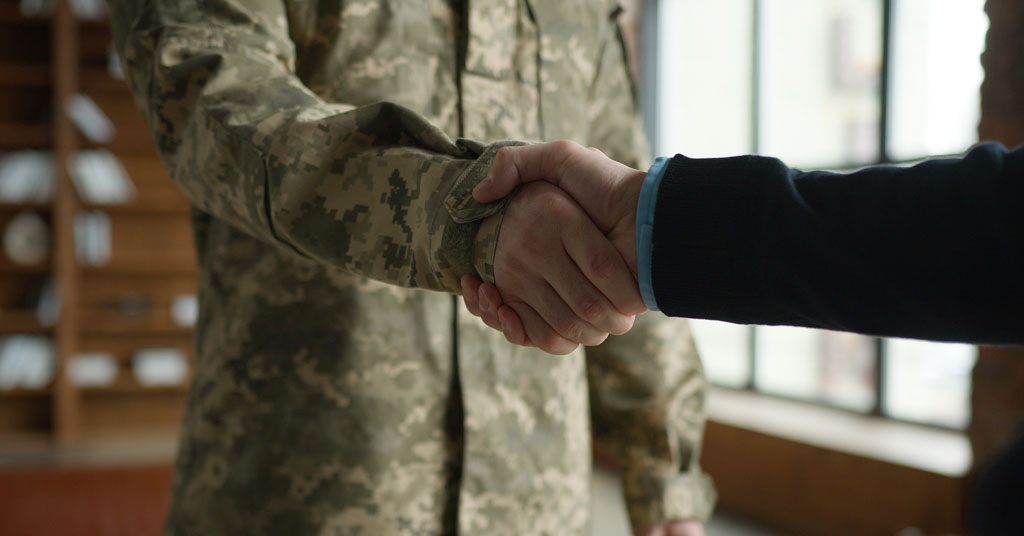Supporting Veterans in Their Journey from Service to Civilian Life

As Veterans Day approaches, we honor the brave men and women who have served our country. But beyond the ceremonies and tributes, we must acknowledge the often-overlooked challenges many veterans face when they transition from military service to civilian careers. For those who have worn the uniform, this shift is more than just a career change—it’s a profound transformation that impacts every aspect of life.
Veterans often find themselves navigating unfamiliar territory, where their valuable skills and experiences are not always easily recognized or understood. Those who have successfully made this transition know the difficulties firsthand and many are dedicated to helping their fellow veterans forge a path toward fulfilling civilian careers.
Navigating the challenges of the transition
One of the most common difficulties veterans face when transitioning to civilian life is the sense of isolation. Leaving the close-knit community and structured environment of the military can feel like stepping into an entirely different world. For those relocating to a new state or city, the absence of familiar connections only intensifies that feeling of disconnection.
Despite being highly qualified, veterans can have trouble finding civilian employment. It’s not uncommon to apply for jobs and face rejection, despite having extensive experience. While military transition programs offer guidance on professional appearance and interviewing techniques, they often fall short in addressing the emotional aspects of the shift.
Skills veterans bring and the gaps to bridge
A major challenge is translating military experience into terms that civilian employers understand. Many veterans struggle to make their skills transferable and aren’t always familiar with job search resources like Indeed or LinkedIn.
Veterans possess a wide range of skills that are highly valuable in civilian careers. Leadership, teamwork, the ability to perform under pressure, and a strong commitment to meeting deadlines are just a few of the assets they bring to the table.
The structured, mission-driven nature of military work contrasts sharply with the more fluid and less defined roles found in many civilian settings, leading to frustration and uncertainty. However, veterans may find themselves struggling when tasks or objectives aren’t clearly defined, as the looser structure of civilian workplaces can be disorienting.
Business models that offer more structured environments, such as franchising, are often a great fit for veterans. The structure and step-by-step guidance provided by franchising, for example, align well with the military mindset. Additionally, roles in staffing, machine operations, and healthcare provide the kind of team-oriented work environments in which veterans tend to thrive. In staffing roles, particularly, veterans find purpose in helping others and giving back to their communities. This sense of purpose is often a driving force for veterans transitioning into civilian work.
Supporting veterans in their job search
To help veterans succeed, it’s essential to provide them with the right tools and resources. Resume writing assistance, interview coaching, and virtual interview practice can make a significant difference in how veterans present themselves to potential employers. E-learning courses can also offer opportunities to strengthen skills and enhance resumes.
One of the most important steps in helping veterans is understanding the full extent of their military experience. Veterans often take on collateral duties, including additional responsibilities that don’t always appear on their resumes but are highly relevant to civilian jobs. Using tools, such as the Military Occupational Specialty (MOS) translator can help to convert military job codes into civilian descriptions to assist veterans in better communicating their qualifications.
For veterans feeling isolated or unsure of their next steps, getting involved in community groups, counseling, or volunteering can be immensely beneficial. Staying connected with others who understand their experiences provides essential support and prevents feelings of isolation.
By acknowledging veterans' unique skills and providing the right resources, employers and staffing agencies can play a vital role in helping them transition successfully into civilian careers. This Veterans Day, it’s important to remember that supporting those who have served goes beyond recognition. It means offering the tools they need to thrive in the next chapter of their lives.
Cowanda Bazile is a franchise owner with Express Employment Professionals in Jacksonville, North Carolina, where she helps connect local residents, including veterans to employment opportunities.
Share this Feature
Recommended Reading:
| ADVERTISE | SPONSORED CONTENT |
FRANCHISE TOPICS
- Multi-Unit Franchising
- Get Started in Franchising
- Franchise Growth
- Franchise Operations
- Open New Units
- Franchise Leadership
- Franchise Marketing
- Technology
- Franchise Law
- Franchise Awards
- Franchise Rankings
- Franchise Trends
- Franchise Development
- Featured Franchise Stories
| ADVERTISE | SPONSORED CONTENT |

$300,000
$500,000





 The multi-unit franchise opportunities listed above are not related to or endorsed by Multi-Unit Franchisee or Franchise Update Media Group. We are not engaged in, supporting, or endorsing any specific franchise, business opportunity, company or individual. No statement in this site is to be construed as a recommendation. We encourage prospective franchise buyers to perform extensive due diligence when considering a franchise opportunity.
The multi-unit franchise opportunities listed above are not related to or endorsed by Multi-Unit Franchisee or Franchise Update Media Group. We are not engaged in, supporting, or endorsing any specific franchise, business opportunity, company or individual. No statement in this site is to be construed as a recommendation. We encourage prospective franchise buyers to perform extensive due diligence when considering a franchise opportunity.